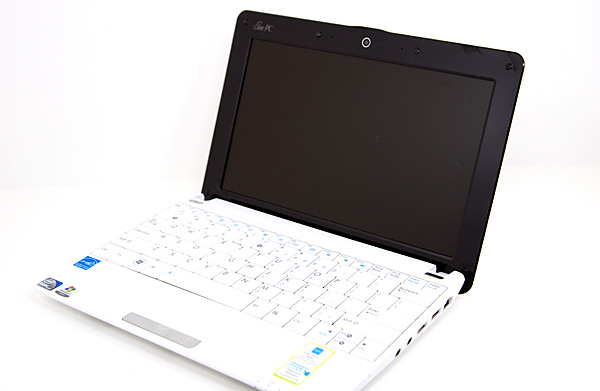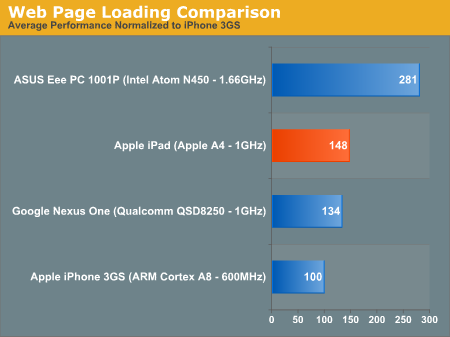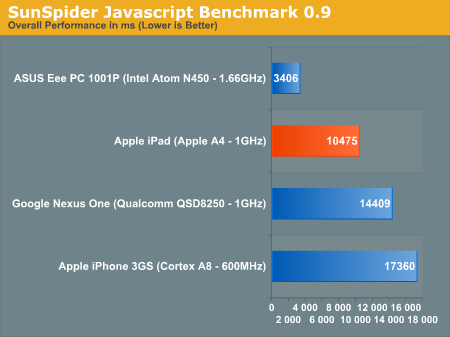Apple's iPad - The AnandTech Review
by Anand Lal Shimpi, Brian Klug & Vivek Gowri on April 7, 2010 9:39 PM EST- Posted in
- Smartphones
- Mac
- Apple
- iPad
- Mobile
The iPad and its Performance
Apple knows how to make things feel fast. It’s all about making animations as smooth as possible and making sure that the UI always responds consistently. Apple isn’t perfect in this regard, but it does pay more attention to detail here than most other companies.
On the iPhone, scrolling is always smooth, swiping between home pages feels quick, apps launching are always well animated. The same is (mostly) true for the iPad, but thanks to a faster processor, many of these animations are physically faster. Bringing up the home screen is lightning quick, as is swiping between them. Scrolling is also very smooth, so much in fact that I found myself scrolling through emails and pages just because the animation was done very well.
There are some rough edges of course. While swiping between home screens is nice and fast, bringing up the quick search screen is choppy (not Android choppy, but choppy for the iPhone OS). The same is true for some other apps, particularly 3rd party ones. The latter point makes sense given that developers haven’t had much time with the device, but Apple not ensuring a perfectly smooth UI across the entire OS is telling.
Apple tends to move engineering resources around the company. The iPhone launch delayed the OS X launch that same year. And the iPad launch surely had some impact on other products. Or is it the other way around? Later this week we’ll see Apple preview version 4 of the iPhone OS, which implies a release sometime in the coming months (June?). An on-track iPhone OS 4 release could explain some rough edges with the shipping iPad, as well as why we don’t seem to have a plethora of amazing apps from Apple at launch.
Despite my nitpicking, this thing is definitely faster than the iPhone 3GS and even the Google Nexus One. Surfing the web, loading applications or generally just interacting with the device. Going to a 3GS from a Nexus One feels slow, going to a 3GS after using the iPad just feels wrong.
But with a larger screen you get the desire to want to do more and expect more from the iPad. I would say that in this sense the performance is a letdown. The A4 is speedy but not quite fast enough for this size of device.
| iPad (Apple A4) | Google Nexus One (Qualcomm QSD8250) | iPhone 3GS (ARM Cortex A8) | iPhone 3G (ARM11) | |
| Manufacturing Process | 45nm | 65nm | 65nm | 90nm |
| Architecture | In-Order | In-Order | In-Order | In-Order |
| Issue Width | 2-issue | 2-issue | 2-issue | 1-issue |
| Pipeline Depth | ??-stage | ??-stage | 13-stage | 8-stage |
| Clock Speed | 1GHz | 1GHz | 600MHz | 412MHz |
| L1 Cache Size | ?? | ?? | 32KB I-Cache + 32KB D-Cache | 16KB I-Cache + 16KB D-Cache |
| L2 Cache Size | ?? | ?? | 256KB | N/A |
| GPU | PowerVR SGX | Adreno 200 | PowerVR SGX | PowerVR MBX |
To figure out where the iPad falls in the grand scheme of things I ran a number of web page load tests and browser benchmarks. To remove the internet from the equation, I loaded all pages off of a server on my own network. This is as close to a pure CPU and OS/browser benchmark as we’ll get.
Given that the iPad runs off smartphone hardware, the obvious comparisons are the iPhone 3GS and Google’s Nexus One. The former is based on a 600MHz Cortex A8, while the latter uses Qualcomm’s 1GHz Snapdragon QSD8250 running Android. Oh and there’s just one more thing:

This is ASUS' Eee PC 1001P. Priced below $300 it is the epitome of the netbook. Low cost and functional, but without looking overly cheap. Based on Intel’s Atom N450 processor this should put things in perspective. I ran the same set of benchmarks on it that I ran on the rest of the platforms. I used Chrome running on Windows 7.
| Apple iPhone 3GS | Google Nexus One | Apple iPad | ASUS Eee PC 1001P | |
| AnandTech Front Page | 4.5s | 4.3s | 3.1s | 1.2s |
| CNN Front Page | 5.4s | 4.4s | 3.9s | 2.8s |
| CNN Front Page 3 | 8.7s | 6.8s | 6.3s | 3.5s |
| 2.5s | 2.4s | 2.0s | 1.4s | |
| MSN | 10.5s | 5.1s | 5.0s | 2.8s |
| Yahoo! | 1.9s | 1.6s | 1.4s | 0.8s |
| Engadget | 15.0s | 11.6s | 11.1s | 4.8s |
To make this data easier to read I averaged all of the numbers for each device, normalized them to the iPhone 3GS (in terms of % faster) and put the data in a graph:

And now you see why I said the A4 does well against smartphones, but doesn’t cut it for the screen size of the iPad. While the iPad is 46% faster than the iPhone 3GS and 14% faster than the Nexus One on average, the Eee PC is 87% faster than the iPad. It is noticeable!
Real world JavaScript performance is also no contest between the A4 and Intel's Atom:

If Apple doesn't have plans to use Moorestown (or a derivitive) in its iPad at some point, I would be sorely disappointed in the company's ability to make intelligent hardware decisions.
I will give Apple credit, the iPad feels quick in most cases, which is probably why the sacrifice to go with a lowly Cortex A8 was made. However, when it comes to browsing the web, there’s a tradeoff. It’s much better reading web pages on the iPad, but it’s much faster on the Eee PC.
The comparison gets more complex when you look at things like application launch times. It takes the iPad 3 seconds to launch Pages, and less than 1 to launch Safari. If the application was previously in memory, the Eee PC can fire up Chrome in less than a second, otherwise it takes longer depending on what Windows decides to do with the disk at that moment. And launching Word from scratch takes much longer than 3 seconds.
Apple is relying on solid state storage and a very lightweight OS while netbooks usually have terribly slow hard drives and a bulky software stack. It’s a ginormous tradeoff. Web pages load quicker on a netbook, but are easier to read/navigate on the iPad.
What Apple absolutely needs in here is an Atom CPU. Apple buys itself a lot of leeway by using a very lightweight OS, but when a web page still takes a dozen seconds to load - you feel the pain. While I realize that Atom hasn't been suited for such an application until now, there's no reason Apple should've picked the A4 over Moorestown. Moorestown can fit in devices far smaller than the iPad, and would make this thing perform more like (and better than in some cases thanks to the OS) a netbook. I laughed when Jobs said that netbooks don't do anything well. While I'd agree a lot of the time, here they do seem to load web pages faster than the iPad.










108 Comments
View All Comments
TGressus - Thursday, April 8, 2010 - link
"I don't think anything anyone can write can convince you"That's a tough sell right there :( Nothing against your post.
This is the challenge all tablets have faced so far. That said, if anyone has the ability to succeed in this form factor it's the iCult.
Mike1111 - Thursday, April 8, 2010 - link
"While I realize that Atom hasn't been suited for such an application until now, there's no reason Apple should've picked the A4 over Moorestown. "I really think it was the right decision for Apple to go with ARM for the iPad, and that it's the right decision to stick with ARM for at least the next few years.
(1) Mobile version of Moorestown is not available yet, the netbook one draws too much power
(2) Apple has to use ARM in it's iPhone and iPod touch for the next few years, so for cross-device OS, app and SoC compatibility and development ARM was the right choice for the iPad (e.g. if Apple makes safari use the hardware better on the iPad, the iPhone and iPod touch will directly profit from it too)
(3) Moorestown would have been more expensive
(4) With ARM Apple can control and modify the CPU design as needed, they have total control. And Apple likes that.
(5a) There is a clear upgrade path for ARM with the Cortex-A9 and a multi-core version of it.
(5b) The A4 is already fast enough for most people and most iPad tasks (how many reviews mention that the iPad is unpleasantly slow, even for the average consumer?)
It's a real possibility that an iPad with a more optimized OS and safari, a better utilized (and more programmable) GPU (like the SGX545 with OpenCL etc.) and a dual-core Cortex-A9 @1.x GHz will improve the browsing performance beyond that of a netbook. And IF APPLE SAW THE NEED FOR IT (but I don't think they do), it could happen as early as next year (other ARM SoCs like Tegra2, OMAP4 and the dual-core Snapdragon will be available by then with comparable specs, so Apple should be able to pull it off too). Intel's Atom will still be a more power consuming, more expensive and way bigger multi-chip system early next year. And beyond that are ARM quad-core CPUs and dual-core GPUs...
It will take Atom at least 4 years to overtake ARM, in the areas that count for dedicated smartphones/slates/tablets, if at all. At some point, real life browsing will just be fast enough on an ARM slate and Intel netbook, so that 99% don't care about browsing speed as a feature anymore (like it will happen with video thanks to all these powerful but small dedicated decoders/encoders like IMG's VXD/VXE).
softdrinkviking - Thursday, April 8, 2010 - link
are you saying that there is no clear upgrade path for intel's moorstown line?and that apple has complete control over the future of ARM?
i didn't know they had already gone that far.
i seem to remember apple fumbling out of the power series of CPUs and crawling into into intel's arms when they realized it was the way to go.
there is nothing to prevent apple from switching to moorstown in a couple of generations, and they have proven that they are willing to make those kind of changes when the situation demands it.
Mike1111 - Friday, April 9, 2010 - link
"are you saying that there is no clear upgrade path for intel's moorstown line?"Of course not. I'm just saying that even if you think the ARM Cortex-A8 used in the iPad is not powerful enough, that there are clear CPU upgrades coming your way for years to come (higher frequencies, Cortex-A9, dual-core Cortex-A9, quad-core Cortex-A9). It's not like Apple is using a quad-core Cortex-A9 @ 4 GHz in 22nm right now, with no better ARM architecture on the horizon and standard lithography reaching a dead end...
"and that apple has complete control over the future of ARM? i didn't know they had already gone that far."
Sorry, what I meant was that Apple has complete control over how they implement the ARMv7 architecture in a chip (since Apple has most likely an architecture license like Qualcomm).
"there is nothing to prevent apple from switching to moorstown in a couple of generations, and they have proven that they are willing to make those kind of changes when the situation demands it."
I agree that Apple can and most likely will switch to Intel if their chips are clearly superior in all the ways that matter for a mobile product. I just think that's at least 4-5 years out for retail devices so there's no point in talking about how Apple should have used Moorestown for this year's iPad... or any iPad for that matter. I don't even think that Moorestown's successor will be ready (Medfield). Maybe Medfield's successor's successor in 22nm will be clearly superior (although parity could be reached a generation earlier). We'll see.
MadAd - Thursday, April 8, 2010 - link
Its huge. Way too big for car centre consoles. If they cut it in half, so its mid way between that and an Iphone then I would definitely want to upgrade my existing car PC.Its got all the right airs and graces to be a super satnav/speedcam/music/incar wifi unit, just need to cut the size and sell it with some kind of some kind of quick release device for power and cabling (or ill fabricate one) and its a winner.
teng029 - Thursday, April 8, 2010 - link
"Companies like Crestron and AMX supply ridiculously poor touch screen interfaces to their very expensive home automation installations."How exactly did you come to this conclusion? Have you extensively either used or program a control system touch panel?
Anand Lal Shimpi - Thursday, April 8, 2010 - link
Used, but not programmed. Those touchscreen controllers are just not in the same league in terms of UI as the iPad/iPhone honestly. I haven't used the latest incarnations but from the looks of them, they haven't changed tremendously.Take care,
Anand
athreya - Thursday, April 8, 2010 - link
1. Does writepad (phatware) or sketchbook pro (autodesk) allow one to take handwritten notes on the ipad? As in, im not looking for handwriting conversion to pages or word but can notes be taken and emailed across in the body of say a gmail or a Mail message? WHich stylus is the best for the ipad?2. How do you think iphone os 4.0 will solve the multitasking problem?
3. Between the wireless keyboard and the keyboard with dock which would you recommend and why? Will ANY BT keyboard work with the ipad?
4. Can you tell us how good it is at projecting powerpoint ppts onto a standard VGA projector? Does it support Office for Mac yet?
thanks a lot Anand. Terrific balanced review as always.
strikeback03 - Friday, April 9, 2010 - link
I doubt any stylus works with the iPad, due to the capacitive screen.dagamer34 - Friday, April 9, 2010 - link
A capacitive stylus would work.